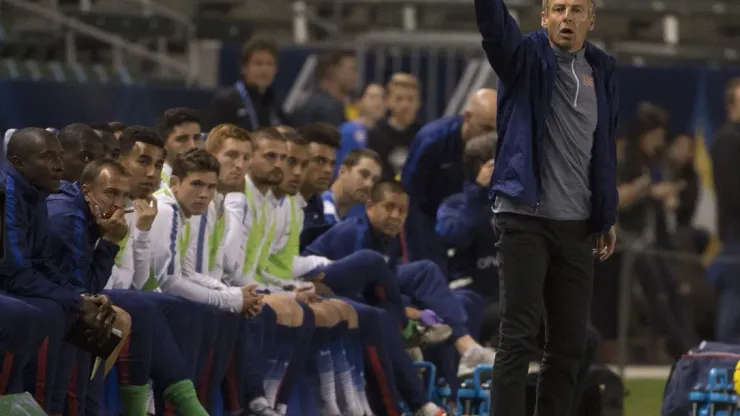The panic signs exhibited by United States fans ahead of tonight’s must-win clash with Guatemala in Columbus are not surprising. The fan base of the United States Men’s National Team has become more disenchanted with the management regime of Jürgen Klinsmann with every passing month. During Klinsmann’s tenure, the USMNT has lurched from crisis to crisis on the field while off-the-pitch passions have boiled over due to the manager’s outspoken nature including his shots at Major League Soccer and his player selection policies. American fans have largely been polarized by Klinsmann, though the manager himself might be the person most responsible for this as he has been an open book with his opinions and set performance benchmarks that, while perhaps unrealistic, he allowed himself to be defined by.
Klinsmann, as I have stated before, was dealt a very bad hand with the current crop of USMNT players. Unlike his predecessors Bob Bradley and Bruce Arena, he didn’t have numerous players excelling in top European leagues to work with or exciting “can’t-miss” type young prospects. But what Klinsmann did have positively compared to his predecessors was a deeper albeit less-talented player pool.
Given the number of injuries impacting core US players, the depth of this pool should have been on full display on Friday night in Guatemala City. But instead the US manager who, as the technical director for the program, fiddled with the tactical setup of the side and chose to play the majority of field players out of position.
Much of this was due to Klinsmann’s prioritization of Olympic qualification as part of his role as technical director.
The United States has made it clear that qualifying for the Men’s Olympic soccer tournament is a priority. And therefore after failing to secure a spot directly through CONCACAF qualifying, a two-leg playoff with CONMEBOL representative Colombia during this international break has further complicated the USMNT’s situation.
While Klinsmann did select and start the Olympic team age eligible DeAndre Yedlin of Sunderland with the senior side Friday night, he allowed several players that might have been helpful against Guatemala to play for the U-23 team instead. Notably amongst this list of players was Chelsea’s Matt Miazga, the Columbus Crew’s Wil Trapp and Seattle Sounders’ Jordan Morris. All three players might have started or played second-half key roles in Friday’s World Cup Qualifier, but instead were toiling in the heat and humidity against Colombia a few hours earlier. The US did get a positive 1-1 result in the away leg, but that strong showing was obscured by the debacle endured by the senior side just hours later against much weaker opposition.
Since Klinsmann took over the United States job in 2011, he’s pointed to the next generation of players as being the one that would take the program forward. Much of his talk from a diversionary perspective had been to ask to be judged on the progression of the program and the development of new players in the system.
SEE MORE: Schedule of international games on US TV and live streaming
However, this has led Klinsmann to take the progression in youth tournaments seemingly with the same seriousness as the success of the senior team. Perhaps we are seeing a shift in thinking with Sunday’s call-up of 17 year-old Christian Pulisic from Borussia Dortmund. Pulisic, who has appeared four times in Bundesliga play since the winter break in Germany ended, is the best prospect the United States has and has already worked his way into the first team for one of the best club sides in Europe.
Pulisic has quickly emerged as a great American hope, but pinning progression this cycle on a 17 year-old is unwise and demonstrates the quandary the United States finds itself in. The USMNT is in a situation where its best players at the international level — with one or two exceptions — are over the age of 30, while those who have actually played at a high-level for good clubs this season tend to be under the age of 23. Borussia Monchengladbach winger Fabian Johnson is the notable exception to both these trends, but in general Klinsmann suffers from not having enough players that can produce who are in their prime to make things work.
But Klinsmann has been an architect of his own demise by his prioritization of youth tournaments and unwillingness to stick with a tactical setup or general style of play. Many of the German’s ideas for the US Men’s National Team program are worth continuing to implement, but should the US fail to defeat Guatemala tonight — and the U-23 team, for which has allowed so many potentially important senior team players to participate with, not qualify for the Olympics — time should be up for him.
200+ Channels With Sports & News
- Starting price: $33/mo. for fubo Latino Package
- Watch Premier League, Women’s World Cup, Euro 2024 & Gold Cup
The New Home of MLS
- Price: $14.99/mo. for MLS Season Pass
- Watch every MLS game including playoffs & Leagues Cup
Many Sports & ESPN Originals
- Price: $10.99/mo. (or get ESPN+, Hulu & Disney+ for $14.99/mo.)
- Features Bundesliga, LaLiga, Championship, & FA Cup
2,000+ soccer games per year
- Price: $5.99/mo
- Features Champions League, Serie A, Europa League & Brasileirāo
175 Premier League Games & PL TV
- Starting price: $5.99/mo. for Peacock Premium
- Watch 175 exclusive EPL games per season






